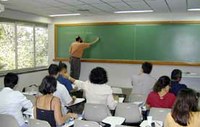Brazil's National Institute of Pure and Applied Mathematics (IMPA) enjoys a well-deserved reputation as a centre of excellence for high-level mathematical research. Indeed its mathematicians have achieved world-class status in several fields, including dynamical systems and geometry.
Yet large segments of the population do not have sufficient knowledge to handle simple calculations involving decimals, fractions and percentages. In a recent international survey of mathematical capabilities among school-age children, conducted by the United Nations, Brazil ranked 53 out of the 56 countries that participated.
Paulo Cezar Carvalho, an IMPA researcher, highlighted this contradiction in a presentation given at the Berlin7 Open Access Conference held 2-4 December at the Université Panthéon-Sorbonne in Paris. He later expanded upon his remarks in an interview with the TWAS editor.
"The gap between the level of scholarship and literacy in mathematics is a reflection of Brazil's poor public educational system," he explains. Although it is possible for students enrolled in public schools to earn undergraduate and advanced degrees in mathematics and become professors and researchers (Carvalho himself followed that path), the reality is that the vast majority of Brazilian mathematicians received their early education in private schools where they benefited from superior instruction at a young age.
"Insufficient knowledge of mathematics is a long-standing problem and will not be solved unless there is a comprehensive effort to reform the entire public education system," he says. "The physical infrastructure needs to be improved, the curriculum enhanced, families encouraged to become more involved with their children's education, teacher salaries increased and the status of teachers in society raised."
In 1991, IMPA launched a programme to address one aspect of the problem: the poor quality of teaching. "The initiative," Carvalho notes, "began as an effort to publish guide books for teaching mathematics in highschools."
At the time, most teachers were using school books published for their students to learn their subject matter and develop their lesson plans.
"IMPA," he says, "believed that the prospects for learning could be improved if teachers were able to draw on more sophisticated material to explain the principles behind algebra, geometry, trigonometry, and the ways in which functions, graphs and probability could shed light on everyday problems." The initiative relied on print material that was made available for a nominal fee to universities offering courses in teachers' training. At first, just three of Brazil's 25 states participated in the programme.
A decade later, with financial support from Brazil's national research funding agencies (including the Ministry of Science and Technology and the National Council for Scientific and Technological Development) as well as the World Bank, IMPA began to use the internet to expand its reach. It not only made electronic versions of the books (again for a nominal fee) but also webcast lectures by IMPA researchers focusing on improved teaching techniques.
Today, more than 2,500 highschool teachers, working in 25 of Brazil's 26 states, participate in the programme. "We try to keep things simple," Carvalho says. "Lectures are shot with three cameras and a microphone and only edited in real time during the broadcast. Local professors are asked to lead the discussion sessions that take place in the afternoon following the morning lectures."
Carvalho readily admits that this initiative "will not radically transform the teaching of highschool mathematics in Brazil. A one-day programme for continuing education will not solve the problem."
Nevertheless it is a step in the right direction and a reflection of the interest that Brazil's mathematicians have for improving the teaching of mathematics. "We are not talking about an obscure field of study," Carvalho says, "but knowledge that is essential for people who want to lead productive and successful lives – and that includes nearly everyone."
For additional information (Portuguese only) about IMPA's programme for continuing education for highschool teachers, see the relevant section on IMPA's website.


